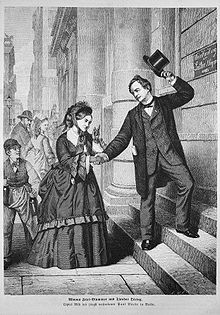Minona Frieb-Blumauer
She stayed there for three years and then moved to Cologne and Aachen, where she performed successfully under Julius Mühling [de], especially in Gioachino Rossini's operas, for example as Rosine in The Barber of Seville.
But it did not last long, and Frieb-Blumauer had a whole series of roles, in plays written especially for her; for what comedy poet would not have liked to have gained a talent for his work, which already guaranteed part of the success through his participation.
It would be wrong to call Mrs. Frieb-Blumauer a speciality as an actress, because that would limit the field of her performances, would mean attributing to her peculiarities which only point to this or that exceptional role.
:[2] The so-called "comic old men", as they are called in the jargon of actors, were artistic achievements which often rose far above the literary value of the sitter; whoever has seen their "wicked stepmother", their "Räthin Seefeld" etc., will not be able to forget these miniature pictures of noblest realism, masterly executed down to the smallest detail.
She mastered all registers of humour, whether she played a cook ("servants"), a distinguished old lady (Frau von Gühsen), whether she appeared in a modern comedy (Madame Michoud in the Bust) or in a classical comedy (Martha Schwertlein) - her victorious, humorous temperament swept everything away with her, up on stage as well as down in the hallShortly after a stay at a health resort in Wiesbaden, from which she had returned apparently recovered, Frieb-Blumauer died unexpectedly on 31 July 1886 at the age of 70 in Berlin.
[3] The funeral service, conducted by Theodor Hossbach [de], the pastor of the Deutscher Dom at Gendarmenmarkt, took place on August 4 in the flat of the deceased in Zimmerstraße.

